|
February 12, 2020
Growing
Opposition to Anti-Social Offensive in Ontario
Oppose
Attempt to Blame Teachers for Problems of Education System
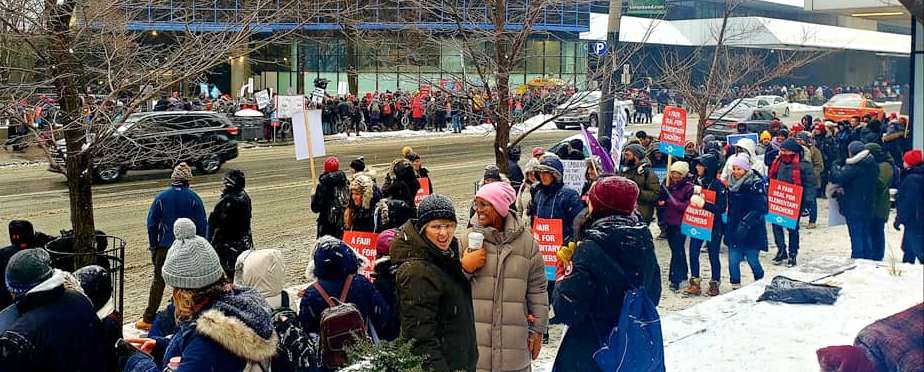
Mass
picket in solidarity with Ontario teachers and education workers fills
both sides of the street outside Ministry of Education,
February 6, 2020.
• February 21 Province-wide Strike: Unite
in Action with Elementary and Secondary Educators
• Toronto Parents
Speak for Themselves in Defence of Public Education
• "They Can't Run the
Schools Without Us" Child and Youth Workers
Speak - Education Is a Right Podcast
• "Relentless Rally"
Organized by Families with Children on the
Autism Spectrum
• Mobilize for the
February 22 PC Policy Convention in Niagara!
Quebec
Public Sector Workers Fight for Their Rights and the Rights of All
• Government
Disinformation to Justify Refusal to Negotiate with Workers
• Interview, Sylvain
Mallette, President, Autonomous Teachers' Federation
Lockout
at Co-op Refinery in Regina
• Denounce the
Criminalization of Co-op Refinery Workers
Growing Opposition to
Anti-Social Offensive in Ontario
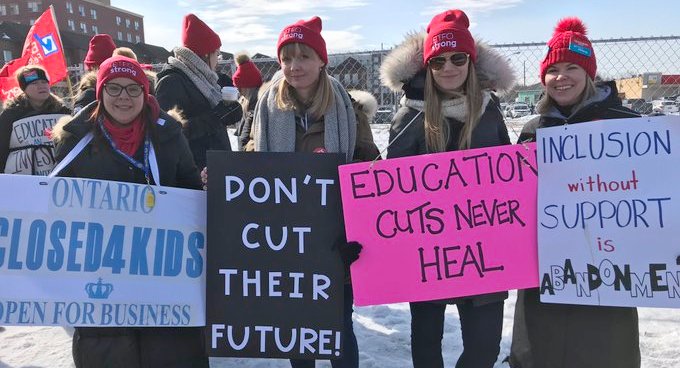
Actions of teachers and education workers,
parents and
entire families continue to grow in Ontario to express their opposition
to the direction the Ford government is taking in Ontario of cuts to
public education and of privatization in particular.
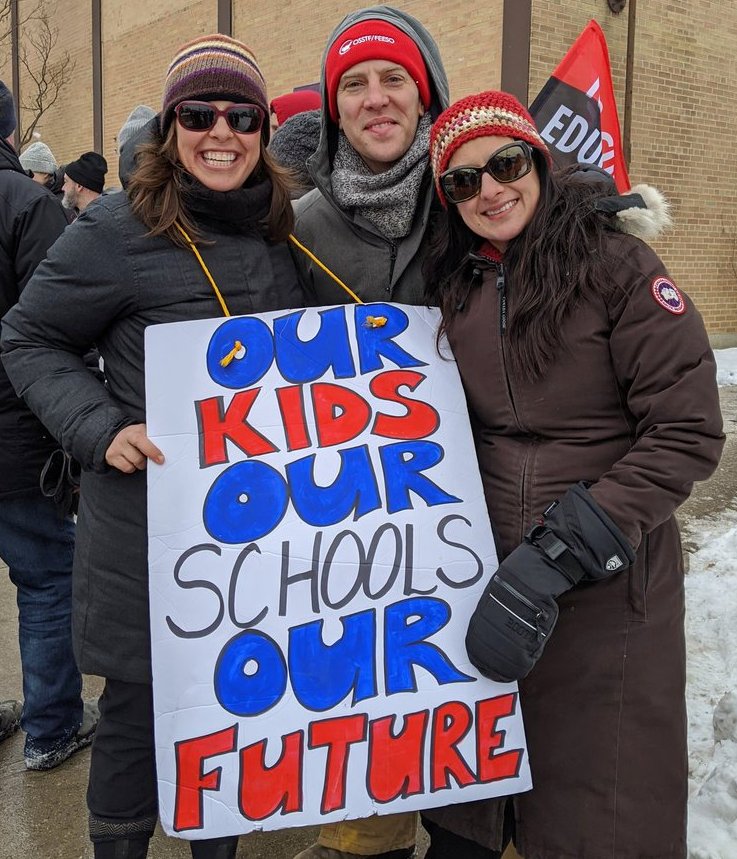 At
this point, all teachers in the publicly funded K-12 education system
in all boards are engaged in various levels of strikes and work-to-rule
actions to express their No!
On
February 13, the province's French as a first language teachers in
both the public and Catholic French systems, organized into the
Association des enseignantes et
enseignants franco-ontariens (AEFO) will carry out a one day
province-wide strike. They are joined by a number of districts of the
Ontario Secondary School Teachers' Federation (OSSTF) and the
Elementary Teachers' Federation (ETFO). ETFO is now holding one
province-wide strike action and one rotating strike action each week,
meaning all
their members are on full strike two days per week. On Friday, February
21, all four teachers' unions -- the Ontario English Catholic Teachers'
Association (OECTA), ETFO, OSSTF and AEFO -- will hold a one-day strike. At
this point, all teachers in the publicly funded K-12 education system
in all boards are engaged in various levels of strikes and work-to-rule
actions to express their No!
On
February 13, the province's French as a first language teachers in
both the public and Catholic French systems, organized into the
Association des enseignantes et
enseignants franco-ontariens (AEFO) will carry out a one day
province-wide strike. They are joined by a number of districts of the
Ontario Secondary School Teachers' Federation (OSSTF) and the
Elementary Teachers' Federation (ETFO). ETFO is now holding one
province-wide strike action and one rotating strike action each week,
meaning all
their members are on full strike two days per week. On Friday, February
21, all four teachers' unions -- the Ontario English Catholic Teachers'
Association (OECTA), ETFO, OSSTF and AEFO -- will hold a one-day strike.
Instead of heeding the opposition, the Ford
government
is now attempting to incite the public against education workers by
claiming that seniority in hiring decisions of new teachers harms
quality teaching while arbitrariness and nepotism in hiring would
somehow improve the system. Like its other attempts, it is clear that
the Ford government
is intent on painting the organization of education workers into
unions, which can defend their rights, as the problem in education,
rather than the reality which is that it is a main factor for the
defence of the quality of education. It shows that one of the main
fights at this time is over the right of those who provide public
services to have a
say over their wages and working conditions and the services which they
provide. For the Ford government, it is the ruling elite who should
make all the decisions while the workers should just
be subject to
the whims of those whose job is to implement an anti-social direction
for public services. It is on this point that the Ford
government has not been able to convince anyone, as the general public
is clear that those who provide the services are the ones who stand for
their improvement.
Photos of February 3-11 Actions
Ottawa Catholic School Board

Durham District School Board

Hastings and Prince Edward District School Board

Toronto District School Board

Toronto Catholic School Board
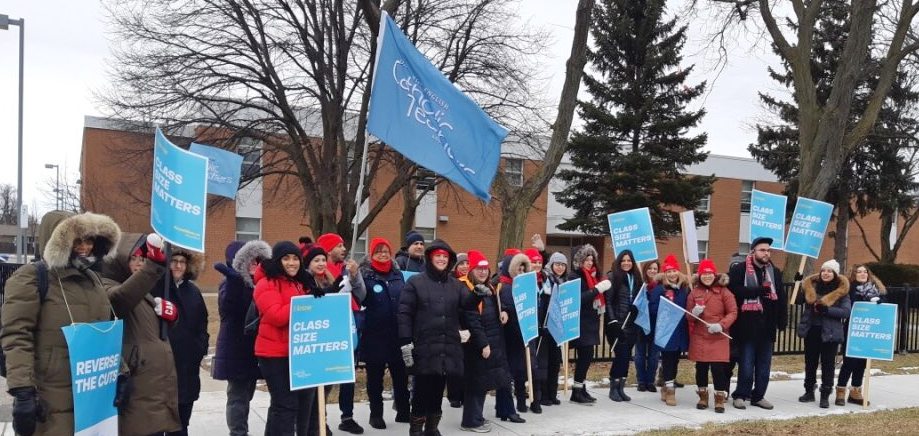
Peel District School Board
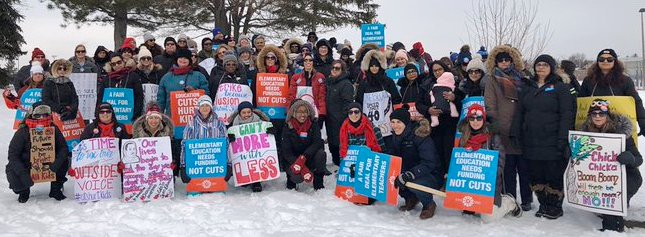
 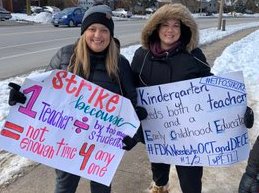
Niagara District School Board

Greater Essex County District School Board
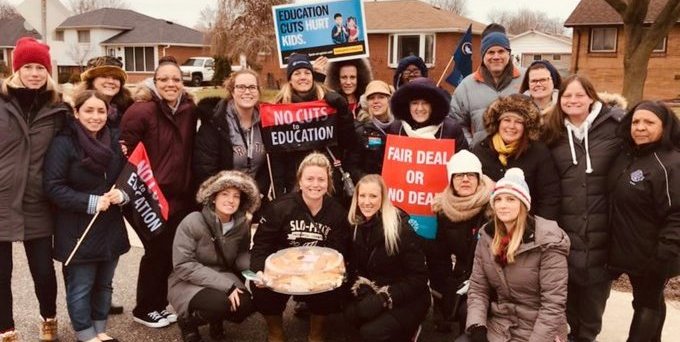
Lakehead District School Board


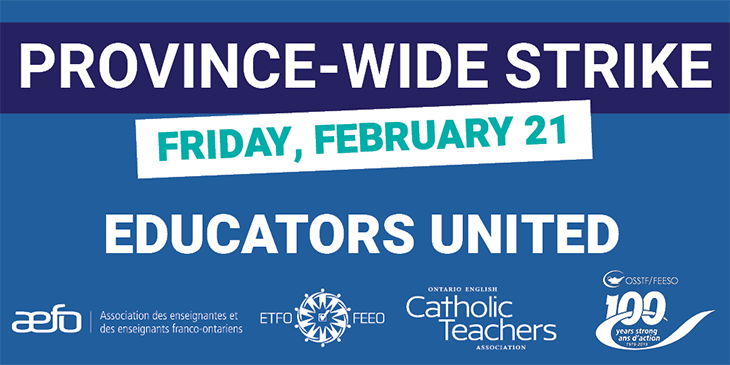
On Friday, February 21, elementary and secondary
teachers and
education workers represented by the Association des enseignantes et
des enseignants franco-ontariens (AEFO), the Elementary Teachers'
Federation of Ontario (ETFO), the Ontario English Catholic Teachers'
Association (OECTA) and the Ontario Secondary School Teachers'
Federation (OSSTF/FEESO) will all walk out together to stand up to the
Ontario government's attacks on public education.
According to a joint press release from the
affiliates, "this is
the first time since the political protest of 1997 that teachers and
education workers from Ontario's main education affiliates will all be
out of their classrooms on the same day. Nearly 200,000 teachers and
education workers will strike across 72 school boards, affecting nearly
5,000 schools across the province in protest of the government funding
cuts to education."
"It is clear to all four Ontario education unions
and our members
that the Ford government and Education Minister Lecce care nothing
about students or educators and everything about taking money out of
the publicly funded education system," says AEFO President
Rémi
Sabourin. "To achieve their cuts, they have knowingly thrown students,
families, educators and the system into chaos."
"We are already seeing the effects of this
government's reckless
education cuts," says OECTA President Liz Stuart. "The Ford government
is reducing supports for students with special education needs and
mental health issues. It is squeezing students into overcrowded classes
and forcing high school students to take e-learning courses. If we
allow the government to implement its plan fully, thousands of teaching
positions and tens of thousands of course options will be lost."
"Educators in every school board will not stay
silent as the Ford
government proceeds to decimate our publicly funded education system,"
says ETFO President Sam Hammond. "Our unions and members helped build
Ontario's world-class education system. By not seriously addressing the
issues critical to students and student learning, the Ford
government has made a sham of contract talks over the last seven
months."
"It is now evident that the Ford government's
agenda is entirely
ideological and not at all concerned with providing quality education,"
says OSSTF/FEESO President Harvey Bischof. "They are pulling resources
out of the public education system and, with schemes like mandatory
e-learning, laying the groundwork for private interests to profit
from our students' education. We are heartened that so many parents are
standing with us against the dismantling of Ontario's public education
system."
Workers' Forum encourages all
those who can to join this
province-wide action and visit picket lines at school sites in their
communities across Ontario to make it clear that the fight to affirm
education as a right belongs to everyone.

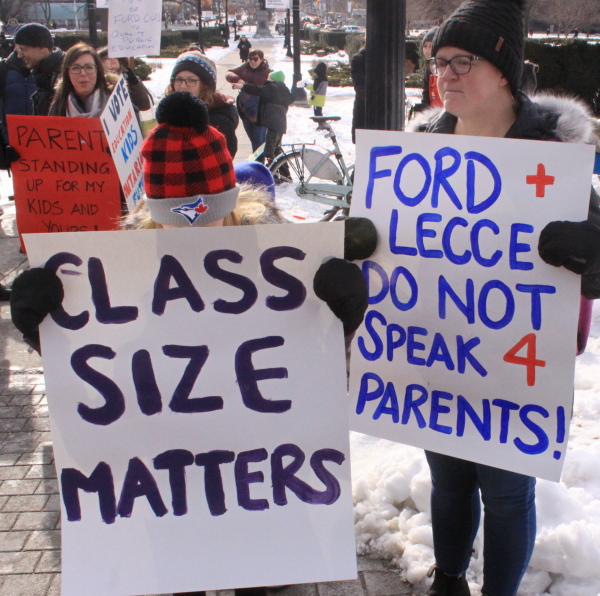 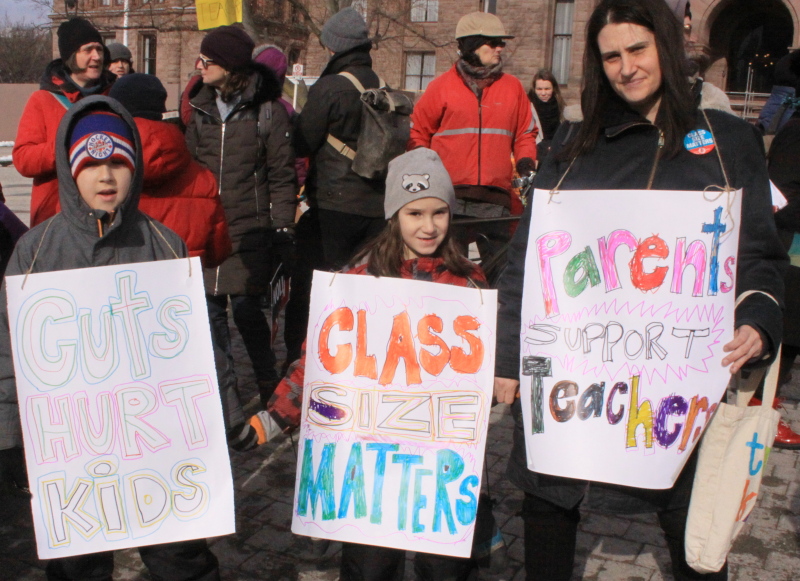
Coinciding with the Elementary Teachers’
Federation of Ontario’s province-wide day-long strike,
parents
and elementary school students held a rally at Queen's Park on Tuesday,
February 11, to publicly speak out against the anti-social cuts to
public education in Ontario and to stand firmly with teachers and
education workers.
The action was organized by Ontario Parents
Against Cuts to Education, a network of
concerned and active parents in Toronto to demand that the Ford
Government stop speaking
in their name in order to undermine the just struggle that Ontario
teachers are waging to
defend their conditions of work and the public education system.
 Parents and
students spoke at the rally and expressed their unequivocal support for
teachers
and the public education system. One woman with two children in
elementary school pointed out
that public opinion is with the teachers and as a parent she knows
first hand the vital and
important role that teachers play in Ontario to educate the young and
prepare them for the
future. She noted that it was unacceptable that the government is
attacking the teachers and
education workers in the name of parents and putting forth spurious
claims about defending
the public school system. Parents and
students spoke at the rally and expressed their unequivocal support for
teachers
and the public education system. One woman with two children in
elementary school pointed out
that public opinion is with the teachers and as a parent she knows
first hand the vital and
important role that teachers play in Ontario to educate the young and
prepare them for the
future. She noted that it was unacceptable that the government is
attacking the teachers and
education workers in the name of parents and putting forth spurious
claims about defending
the public school system.
Another parent chastised the media for attempting
to isolate the teachers and misrepresent
their demands which are just and fair. Several grade 5 and grade 6
students took the mic to say
why they had come to the rally, voicing their concern for their own
education and that of
future students in Ontario.
At the rally, Parents Against Cuts to Public
Education
circulated an open letter addressed to Premier Ford and Education
Minister Stephen Lecce noting that they have been speaking to the media
and at public events and through social media about "what parents want"
and saying that parents are getting "impatient" with teachers and
making other claims. The letter takes Ford and Lecce to task for these
remarks pointing out that they have had "no significant dialogue" with
Ontario parents and therefore cannot speak in their name. The letter
also warns them that parents will not be "shut out of this
conversation" where decisions "your government makes do not just impact
student's academic futures -- they affect our children's physical and
mental health." Many in attendance signed the letter.
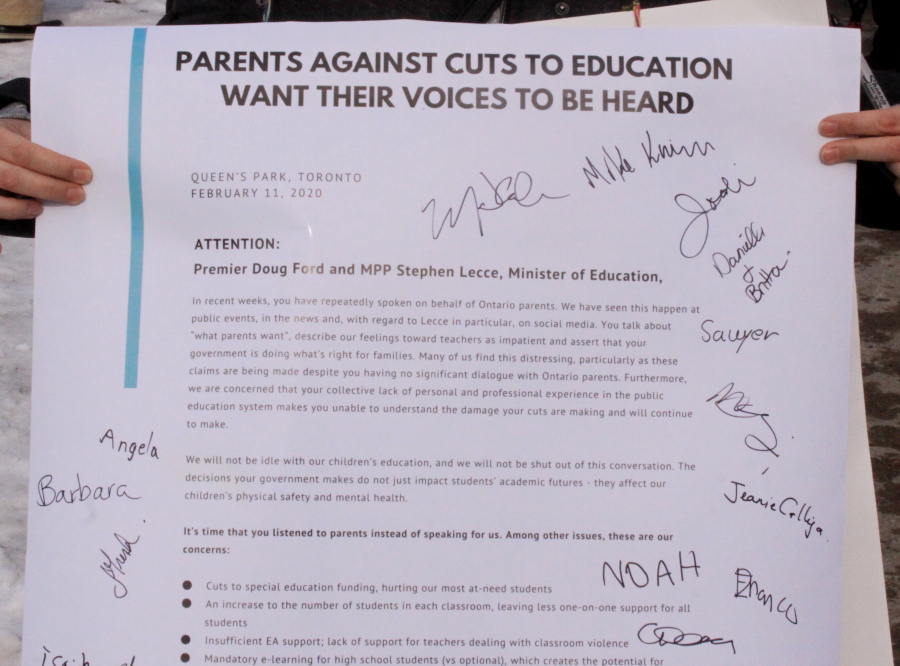 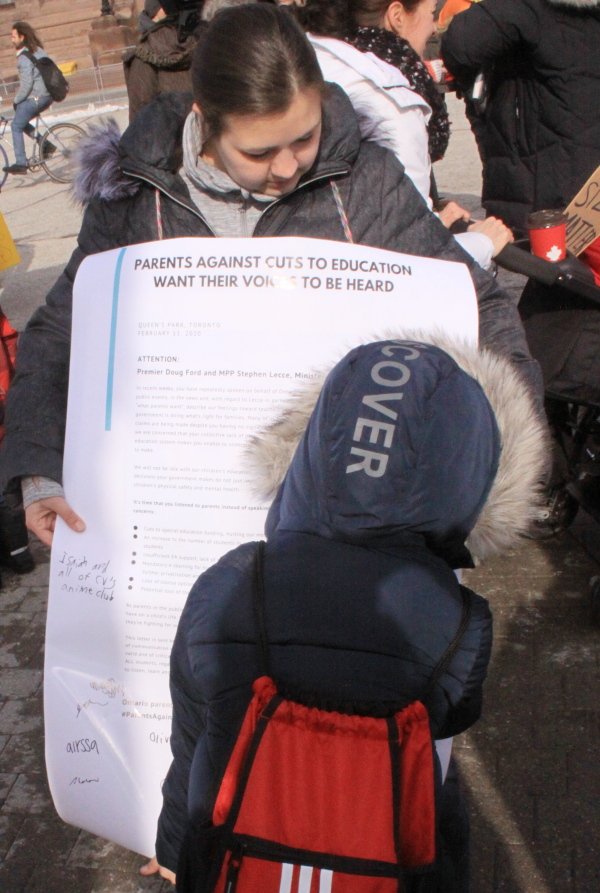
The letter makes specific demands to immediately
stop cuts to special education funding
affecting the most at-need students; to reduce the number of students
in each classroom to
improve support for all students; and to hire more Education Assistants
(EA) to provide more
classroom support and management. The letter also calls for the
government to make
e-learning optional and not mandatory because it means less teacher
support to students and
paves the way for further privatization of public education. The letter
also decries the loss of
course options for secondary school students and the potential cuts to
the one teacher, one
early childhood educator (ECE) model kindergarten currently in place.
The letter also informs Ford and his Education
Minister:
"As parents in the public school system, we have witnessed the
immeasurable impact an educator can have on a child's life. We value
teachers, EAs, ECEs, and support staff, and are incredibly grateful
they're fighting for our kids. A strike is inconvenient, but the
alternative is far worse."
Parents have been organizing across the province
in support of the striking teachers and education workers. The
battle for public opinion on the question of public education in
Ontario is raging. The parents
are not taken in by the claims of the government that the changes it is
trying to implement are
in the interest of public education or their children. They are
speaking from experience and
with conviction, demanding the government listen to them rather than
"speaking for
them."

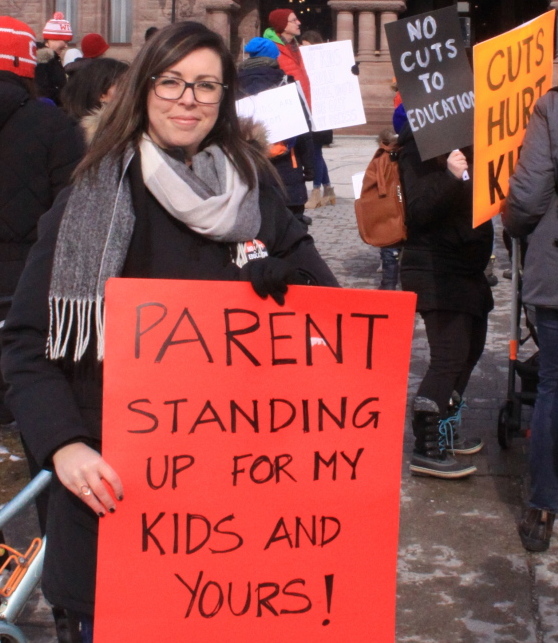 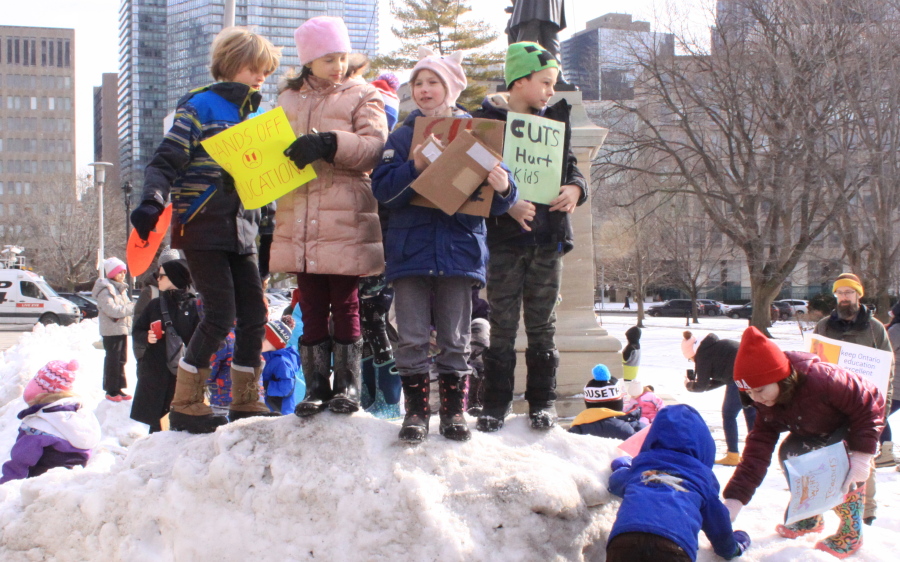

- Education Is a Right
Podcast -

Posted below is Episode 26, Part 1 from the
website
edisaright.ca. It features an interview with two child and youth
workers, Lisa and Richard, about the important work they do and what
Ontario classrooms of today look like from their perspective.
To listen to or download the podcast click
here.

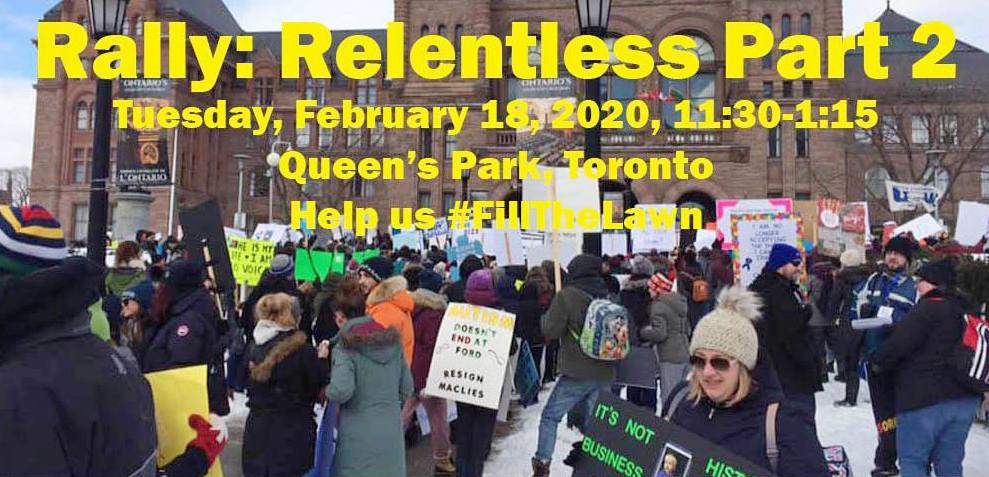
On February 18, families of children on the
autism
spectrum and those on the spectrum themselves are holding a mass action
at Queen's Park to oppose the Ford government's plan to destroy the
existing needs-based system for determining funding for services for
youth on the autism spectrum with a flat funding allotment that treats
these youth
as a statistic without any differences or specific needs. The action
dubbed "Relentless" should be supported by all who are able, to show
that the most vulnerable in the society will not be permitted to be
isolated and left to fend for themselves.
Relentless:
Part 2
Tuesday, February 18 -- 11:30 am-1:15 pm
Queen's
Park, Toronto
Facebook


On February 21 and 22 the Progressive
Conservative Party of Ontario will hold
its policy convention in Niagara Falls. Mobilization of working people
from across Ontario has begun with busses being filled from all parts
of the province. Everyone who is able to is encouraged to join the
action
to show with one voice the stand of the working people of Ontario
against the anti-social offensive and for the rights of all.
The People
Vs. Conservative Cuts Rally
Saturday, February 22 -- 10:30 am
Scotiabank
Convention Centre
6815
Stanley Avenue, Niagara Falls
For
bus information click
here

Quebec Public Sector Workers
Fight for Their Rights and the Rights of All
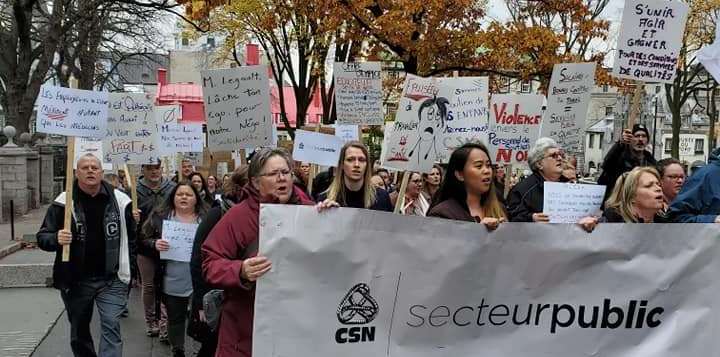
On February 3, Christian Dubé,
Quebec's Minister
Responsible for Government Administration and Treasury Board President,
sent an open letter to the media regarding the renewal of the
collective agreements of some 500,000 public sector workers. The letter
bears the arrogant title "The priorities of Quebeckers at the heart of
the
negotiations."
Nowhere in the letter does one find even the
slightest
reference to the concerns and demands that public sector workers have
been presenting, not only during this renewal of their collective
agreements, but over the last 20 years. Workers and their unions have
and continue to raise the alarm that public services are at a breaking
point, as a result
of untenable working conditions as well as the conditions for the
delivery of services; teachers (see interview below) have been raising
the issue of how they continue to suffer. The demands put forward by
the workers and unions renewing their labour contracts are aimed at
addressing the situation through an immediate and significant
improvement in public sector working conditions and wages.
In an irresponsible and even criminal manner, the
Quebec
government continues to deny this state of affairs, replacing it with
what it has defined as "the priorities of Quebeckers." According to the
government, Quebeckers' priorities are their ability to pay, the
conditions facing care attendants and new teachers which require
improvement, and
the need to overturn traditional negotiation methods by establishing
government-controlled discussion forums in parallel with negotiations
(or rather their absence) to which "additional sums" are to be
allocated,
according to the government's goodwill.
According to the Treasury Board President, this
all
emerges from the mandate given to the Coalition Avenir
Québec
during the October 2018 Quebec election, through which it was brought
to power by garnering only 38.5 per cent of the registered vote, while
34 per cent of eligible voters did not even cast their
ballot. Rather than
political discussion on the problems facing Quebec society, that
election saw an extreme level of sectarian attacks by the cartel
parties against each other. The letter reads: "[...] the government was
elected to make changes that meet the priorities of Quebeckers. [...]
During the October 2018 election, Quebeckers clearly expressed their
desire for
change by breaking with almost half a century of alternating between
the Liberal Party and the Parti Québécois. Voters
expressed a desire that elected members be creative; to dare to explore
new avenues to meet the important challenges facing us."
The Government of Quebec is creating a serious
risk for
workers and the public by seeking to perpetuate and worsen the crisis
affecting social programs and public services. It is doing so in favour
of the state dictate it represents as the party-in-power, in favour of
its schemes to eliminate negotiations with workers, all in the service
of private
interests. We cannot accept that its sectarian interests supplant the
efforts of public sector workers and their unions to make their voices
heard and speak in their own name for the renewal of collective
agreements.
Can the government explain to us who these
"Quebeckers"
are who would be examining the state of affairs of public services from
the perspective of "their ability to pay," based on how neo-liberal
governments decide on their budgets? Quebeckers are public sector
workers, their families, and all those who use public services and
depend on
them during their lives. They are aware of the crisis affecting social
programs and public services because for decades now they have been
experiencing it and asking that it be resolved to the benefit of the
workers and the services themselves. To achieve this, their voices and
mass
actions in defence of their claims are essential.
The Quebec government must back down and sign
collective
agreements which include wages and working and retirement conditions
acceptable to public sector workers, the very people who are doing
the work for us all.

Workers' Forum:
What are the main features of the offer from the Management Negotiating
Committee that was presented to you at the end of 2019?
Sylvain Mallette:
The concept which guided
the employer in drafting its offer can be summed up in the
following words: optimal use of the teaching staff. In our opinion, it
is an expression of violence. The employer proposes to use us
optimally, that is to say until we are exhausted, until we are out of
breath.
It is a contemptuous and utilitarian look at the
teaching profession. They want teachers to simply carry out orders.
Teachers must do what they are told to do, as and when they are told to
do it. At the same time, they are being held responsible for everything
that goes wrong. They are being made responsible for academic success.
They are
given a role similar to that of a social worker, without giving them
the means they need to accomplish this work.
There is a desire to deny what a collective
agreement
is. We are an organization which negotiates a labour contract with
working conditions. Yes, we are concerned about educational success,
and having good working conditions ensures better learning conditions,
especially for the most vulnerable students. We have the right to have
good
working conditions. In this regard, the conditions under which they
want us to work are unacceptable. I made it clear last December that
the employer's offer cannot and will not constitute a basis for
negotiation. For example, the employers want to give themselves the
means to no longer respect the average and the maximum number of
students
per class. They want to be able to no longer take students from low
income families into account when forming groups. Yet we know very well
that living in a disadvantaged environment, with students who suffer
poverty and their parents who suffer poverty, has colossal consequences
on academic success, culture and equal opportunities.
According to the employer's offer, the teacher, in
order
to have access to resources and services, should demonstrate that he or
she has tried everything before making a request. What does that mean
except that the teacher will be pushed to the limit, that they will
burn the teacher out completely, that he or she will be constantly in a
position of
weakness and that he or she will have to justify the call for services
and resources. It is completely unacceptable. This is being done under
the hoax of enhancing the profession, and yet the task is being
individualized and the teacher is made responsible for everything,
especially whatever goes wrong. The burden of academic success is put
on the
shoulders of the teacher. In other words, the teachers have to fend for
themselves in the classroom, almost abandoned, having to meet the needs
of all students, regardless of what those needs are and the existing
level of resources and services.
In the employer's offer, there is also a desire to
eliminate the subjects for which there must be consultation by
management with the teachers and for which the teachers choose the
appropriate consultation mode. This is going back 50 years. They talk
about enhancing the profession but in fact our role is reduced to that
of obeying orders.
This would only contribute to the suffering of
teachers. The teaching profession is suffering and we are not going to
negotiate the suffering of our teachers. This suffering stems from a
staff shortage -- nearly 25 per cent of teachers leave the profession
before the fifth year of practice. People no longer choose our
profession. Early
retirement is on the increase even if it causes a reduction in the
amount of pension you get. The teachers become poorer during
retirement when they take early retirement. Psychological distress is
on the rise. The rates of short-term disability claims, two years or
less, are skyrocketing. Fifty per cent of these cases are caused by
psychological distress. The teachers can't take it anymore. They carry
the weight of having to do more with less.
The employer's offer shows that the school
authorities are envisaging educational networks and systems in line
with the neo-liberal vision of the relationship of human beings with
the
state and public services, and of the relationship between humans
themselves. We are in a market logic, where we do in the public sector
what is being
done in the private sector. We adopt "lean" approaches, production
methods of private industry. It is very disturbing. In this logic,
children from low income backgrounds are simply reduced to a category,
of being a costly expense to the system. So children from those
backgrounds are put into conditions that are much inferior to those of
pupils
from more privileged classes who have access to culture and services.
Children from low income backgrounds are being trained, right at the
end of their second year of secondary school, to occupy semi-skilled
jobs. The public school as the system in which we wanted to create
equal opportunities is being cast aside. Now the public school is
placed
in competition, not only with the private school but with itself,
because
it is accepted that certain public schools can select which pupils they
will enrol. The people who drafted the employer's offer are no longer
the guardians of the public school that we had given ourselves. They
subscribe to the neo-liberal market and utilitarian vision of the
public school network.
WF: What are
the demands of the FAE in this context?
SM: We want
to improve the daily lives of
our members to ensure that our working conditions allow us to achieve
our mission which is to educate students, especially students from low
income disadvantaged backgrounds who, with their families, suffer
poverty. It is with a humanist approach that we address the
negotiations.
By negotiating our working conditions, we also negotiate the learning
conditions of our students. As teachers, we have the right to good
working conditions and as citizens we are the guardians of the public
school. If we accept the weakening of our conditions, we accept the
weakening of the public school.
We also ask to be recognized as pedagogical
experts who
have the right to choose the best pedagogical approaches, assessment
tools and methods of intervention with our students.
We also want to ensure that teachers have access
to
permanent jobs. It is part of recognizing who we are. It is not normal
for teachers who are approaching retirement, some with 35 years of
service, to still be working under precarious employment contracts.
Teachers are being maintained in precariousness, and these are mainly
women because
women represent 73 per cent of the teaching profession.
We must also make sure that the schools form
groups
which take into account the difficulties which the pupils have -- all
of the pupils. Those who teach groups with the greatest difficulties
must have fewer students to respond to these realities. Or we must
create classes for these students which does not mean withdrawing them
from society
but recognizing that in their educational path they need special help
that we will give them, even if it costs more, to give them time to
realize themselves as human beings.
These things must be said, but action must also be
taken, which poses the problem of trade union mobilization and action.
We must stand together and recognize the usefulness of trade union
action which improves conditions for the whole of society. When we make
gains, it uplifts those who do not have access to unionization, who
have
broken up work schedules, like all the women who must have two or three
jobs and who live in precariousness.
The
Autonomous
Teachers' Federation (FAE) represents 45,000 teachers in Quebec's
public schools. The nine unions affiliated with the FAE represent
preschool, elementary, secondary, adult education and vocational
training teachers in seven regions of Quebec.

Lockout at Co-op Refinery in
Regina
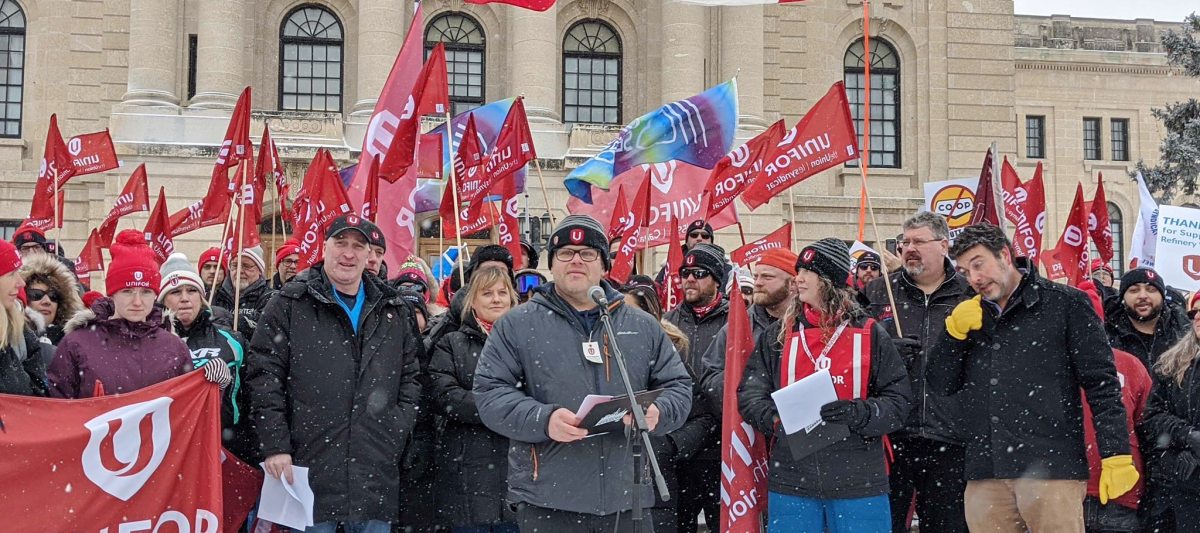
Co-op Refinery workers, members of Unifor Local 594 rally at
Saskatchewan legislature, January 30, 2020.
Federated Co-operatives Limited (FCL) locked out
the
workers at its refinery in Regina on December 5, two days after the
workers voted to strike rather than accept the company's bargaining
demand that the workers agree to a significant reduction in their
pensions. The company had, in previous bargaining, committed to
maintaining the
defined benefits pension plan that had been agreed to in negotiations
years ago.
The conditions for the company to continue
operations in
the event of a strike or lockout had been put in place weeks before the
company's action, with the building of work camps to house replacement
workers flown in to the refinery so as to render the workers' defence
of their rights ineffectual.
Throughout the lockout FCL has received
the full support of the state against the workers. The company was
awarded an injunction requiring that picketers hold up trucks entering
or leaving the refinery for no more than ten minutes. Late in January
the Co-op workers were joined by hundreds of workers from other unions,
as well as Unifor members from across the country, to mount an
effective picket, erecting barricades and preventing movement into and
out of the refinery. Several participants, including local and national
officers of Unifor, were arrested in those mass actions.

Steelworkers join Co-op refinery workers on the picket line, February
1, 2020, one of many solidarity delegations received by the locked out
workers.
Unifor workers and their supporters have also
blocked
movement into and out of the FCL fuel storage facility in Carseland,
about 65 kilometres southeast of Calgary, erecting fences and
restricting the access of vehicles into and out of the facility. This
led to periodic fuel outages at Co-op gas bars and cardlocks in western
Canada. The company has imposed fuel restrictions at its cardlocks of
300 litres of diesel and 100 litres of gasoline. Locked out workers are
rightly blaming FCL dictate for stealing their negotiated defined
benefits pension plan and the Saskatchewan government's refusal to
force FCL to negotiate in good faith for the gas shortages. They uphold
their right to wage an effective struggle that actually blocks the
company's attempt to wreck their negotiated pensions and benefits by
refusing to negotiate, flying scabs into the refinery at great risk to
the safety of the community and relying on the prerogative powers of
the state to crush the workers and their unions.
On February 6, Justice Glenda Campbell in Calgary
granted
the company's application for an injunction restricting picketing at
the Carseland facility and requiring that workers remove barricades,
and the following day amended the injunction to allow police to remove
the barricades if the workers did not do so themselves. In Regina, on
February 7 police blocked access on Ninth Avenue North between McDonald
and Winnipeg streets to all picketers while escorting Co-op trucks
through to the refinery, checking off drivers' names from a list
supplied by FCL. Police then took the additional step of removing the
workers' warming and bathroom facilities from the sites.

Police escorting Co-op trucks through workers' picket lines, February
7, 2020.
A decision by Justice Neil Robertson is pending in
response to the company's demand that the local union be fined a
million dollars plus $100,000 per day as long as the injunction is not
"obeyed" and that Local 594 President Kevin Bittman and Vice-President
Lance Holowachuk be jailed for 90 days and 30 days respectively if they
do not
comply with the court order to remove the barricades that were erected
on January 20.
On February 6, National union leader Jerry Dias
called on Premier Scott Moe and FCL to bring an immediate end to the
dispute by granting an independent provincially-appointed mediator the
power to arbitrate if the parties are unable to come to an
agreement after seven days of bargaining. The union's position was
that if the employer immediately removed replacement workers from the
refinery and agreed to negotiate, the picket lines would be taken down
and the workers would return to work as early as Monday, February 10.
Once again the company refused to return to negotiations. FCL
is still refusing to do so, claiming that until the barricade is
removed it will not negotiate, and refusing to remove the scabs.

Secondary picket at Co-op facility in Dryden Ontario supporting Regina
Co-op refinery workers, February 4, 2020.

(To access articles
individually click on the black headline.)
PDF
PREVIOUS
ISSUES | HOME
Website:
www.cpcml.ca
Email: office@cpcml.ca
|

